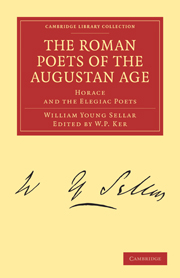Book contents
- Frontmatter
- EDITOR'S PREFACE
- Contents
- Dedication
- WILLIAM YOUNG SELLAR
- HORACE
- CHAPTER I LIFE AND PERSONAL CHARACTERISTICS OF HORACE
- CHAPTER II THE SATIRES
- CHAPTER III HORACE AS A MORALIST
- CHAPTER IV HORACE AS A LITERARY CRITIC
- CHAPTER V HORACE AS A LYRICAL POET—THE EPODES
- CHAPTER VI HORACE AS A LYRICAL POET—THE ODES
- THE ELEGIAC POETS
CHAPTER VI - HORACE AS A LYRICAL POET—THE ODES
Published online by Cambridge University Press: 07 September 2011
- Frontmatter
- EDITOR'S PREFACE
- Contents
- Dedication
- WILLIAM YOUNG SELLAR
- HORACE
- CHAPTER I LIFE AND PERSONAL CHARACTERISTICS OF HORACE
- CHAPTER II THE SATIRES
- CHAPTER III HORACE AS A MORALIST
- CHAPTER IV HORACE AS A LITERARY CRITIC
- CHAPTER V HORACE AS A LYRICAL POET—THE EPODES
- CHAPTER VI HORACE AS A LYRICAL POET—THE ODES
- THE ELEGIAC POETS
Summary
The Odes
It is for his Odes that Horace claims immortality, and it is to them that he chiefly owes it. Scarcely any work in any literature has been so widely and so familiarly known. Almost from the time of their author's death, they became what they have been since the revival of letters, one of the chief instruments by which literary taste and a delicate sense of language have been educated. The music of their verse, the grace, lucidity, and terseness of their diction, the truth and, at the same time, the limitation of their thought, impress them on the memory; while their applicability to the ordinary experience of life has brought them more into the currency of quotation, in speech and writing, than the words of any other writer. Changes in literary taste and speculative thought do not seem to affect the estimation in which they are held. They gain and retain the ear of each generation from the perfection of their form and the importance of their meaning. No ancient writer has so much excited and so much baffled the ambition of translators; and scarcely any still continues to find so many critics and interpreters.
Yet among his professed admirers, the most opposite opinions appear to prevail as to the ground on which his distinction as a lyrical poet chiefly rests. He seems to speak to each reader in accordance with his prevailing mood.
- Type
- Chapter
- Information
- The Roman Poets of the Augustan AgeHorace and the Elegiac Poets, pp. 132 - 198Publisher: Cambridge University PressPrint publication year: 2010First published in: 1892



